It's good to chalk: snooker and health
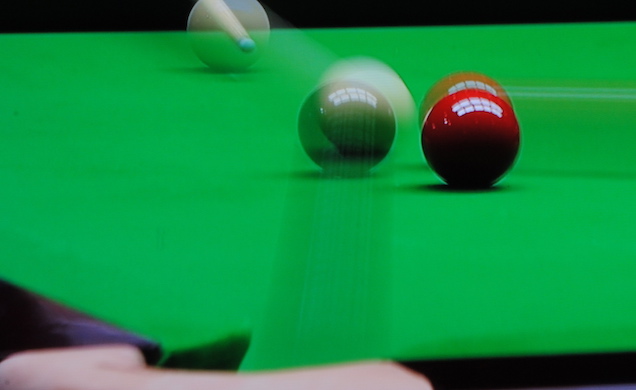
Once upon a time, snooker was played through a haze of cigarette smoke and alcohol. Not any more.
Today’s players are fit and sharp and if you’re tuning into the marathon that is the World Professional Snooker Championship, you need to be fit and sharp too.
The Men’s Health Forum have teamed up with the World Professional Billiards and Snooker Association (WPBSA) to provide this essential survival guide. So lets get the ball rolling…
Don’t get snookered
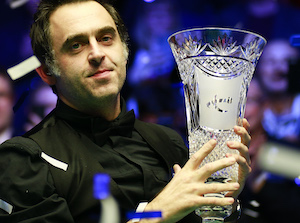 What do you think of the odds of 4-1? Would you take a punt on that? For this year’s world championship only Ronnie O’Sullivan (5-2) is priced shorter than this. A whole host of other top former finalists are priced far longer: Judd Trump (5-1), Neil Robertson (6-1) and John Higgins (18-1).
What do you think of the odds of 4-1? Would you take a punt on that? For this year’s world championship only Ronnie O’Sullivan (5-2) is priced shorter than this. A whole host of other top former finalists are priced far longer: Judd Trump (5-1), Neil Robertson (6-1) and John Higgins (18-1).
Why 4-1? Because those are the odds of the average man dying before the age of 65. In other words, you’re more likely to die before you retire than anyone bar Ronnie is likely to win this year’s World Championship. If that makes you think, you’ve come to the right place because snooker is a sport that makes you think.
Reigning champion Mark Williams is 20-1. Those are the same as the odds on Portugal winning football’s Euro 2016 - which they did - and also the same as the odds on you dying in an accident. (So, risk-taking is more er, risky, than you might think.) Mark Selby, the champion in 2017, is 9-1 - that’s the same odds as on a UK male getting diabetes.
You see where we’re going with this? You might like a bet but don’t gamble on your health. It’s not just you who loses - your family and friends do too. Follow the tips in this survival guide.
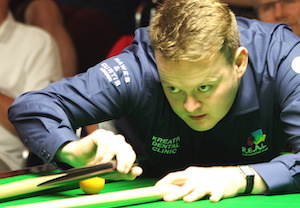 By the way, what about Shaun Murphy at 50-1 for a topical punt? Reputed to have the straightest cue action in the game, his fellow pros call him ‘the prime minister’. No, this isn’t because he’s always asking for an extension but because he’s head of the players’ commission.
By the way, what about Shaun Murphy at 50-1 for a topical punt? Reputed to have the straightest cue action in the game, his fellow pros call him ‘the prime minister’. No, this isn’t because he’s always asking for an extension but because he’s head of the players’ commission.
It’s good to chalk
Snooker is good for your health. Really? Cue laughter.
If you don’t believe us, listen to health researcher Rohit Sagoo, right, from Anglia Ruskin University who says playing it can boost wellbeing and self-confidence: ‘There was an idea among some people I interviewed that poor mental health might be a barrier to playing snooker. In fact my research showed the opposite. Snooker assists with overcoming mental health issues by individuals actually participating actively in the sport. I spoke to one British soldier, who said he wouldn’t have got over the trauma of Afghanistan without snooker.’
So how can snooker help you?
- Suits all ages - a 90 year old can play a nine year old.
- Beginners can play - anyone can pick up a cue and as progress initially is quite quick, there’s an immediate sense of achievement.
- It’s mindful - being on your own in the spotlight of a lighted table in a darkened room takes you away from your problems and helps you focus on the game.
- You need to think - Rohit compares snooker to chess. You’re trying to outmanoeuvre your opponent. You need to plan ahead (where are you going to try to put the white ball?), count and add and calculate angles and relative speeds while still finding the mental discipline to concentrate 100% on the specific shot you’re playing.
- You’re in charge - snooker is one of the rare games where you can truly play at your own pace. Sociable (but not in a way that feels pressured) - when you’re not at the table, you can chat (or not) to the other players. Perhaps have a drink. Even step out for some fresh air.
- You’re unlikely to get injured - a good thing to avoid in any sport (but be careful you don’t get your hand stuck in a pocket - a number of fire brigades have attended such calls!)
One research participant told Rohit: ‘Snooker helps to develop a host of mental skills and traits that are used in everyday life, such as concentration, the ability to calculate risk and the importance of being patient’. Another mentioned problem-solving skills that could be transferred to the work environment.
True, snooker is never going to be the most athletic sport in the world but it still has physical health benefits. The WPBSA reckon the average player walks around 3,000 steps in one hour solo snooker practice - well on the way to your daily target of 10,000. The stretching and bending also helps keep you supple as you get older.
The long game
The top players today like Ronnie O’Sullivan and Judd Trump will workout at the gym to improve their physical and mental endurance at the table. Rohit reckons exercise plus good nutrition is what enables a player like O’Sullivan to keep concentrating at an age when previous generations of players have started to lose focus in the longer games.
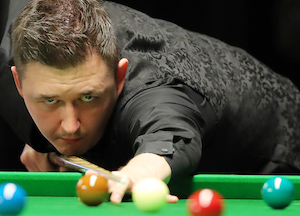 These days, age is no object. Last year’s finalists John Higgins and Mark Williams were 42 and 43 respectively. By contrast, Stephen Hendry won the last of his seven world championships - the most in the modern era - at the age of 30, Steve Davis, the last of his six at 31.
These days, age is no object. Last year’s finalists John Higgins and Mark Williams were 42 and 43 respectively. By contrast, Stephen Hendry won the last of his seven world championships - the most in the modern era - at the age of 30, Steve Davis, the last of his six at 31.
Other players who take a keen interest in their fitness include Kyren Wilson, whose brother is a personal trainer, and Michael Holt who is a qualified fitness instructor himself. Holt says: it’s all about personal preference. I lift weights because that’s what I enjoy. I have tried running but I didn’t enjoy it. But I believe that being in good shape will help anyone and give them more confidence in everything they do. The best player in the world is Ronnie O’Sullivan and he’s also one of the fittest – that’s not coincidence.’
Pot belly
Who said this: ’When it comes to snooker, I should be on the way down by now, but here I am in my 40’s still competing at the top of the game and fitter than ever.’
It was Ronnie O’Sullivan, who regained the world number one spot in 2019 at the age of 43. He was promoting his latest book. Not an autobiography but 80 recipes. Yes, you read that right. Recipes.
Ronnie nails diet like a table-length pot that doesn’t touch the sides: ‘I truly believe what you eat keeps you young. There are kids half my age competing and they can’t concentrate because they eat rubbish and never put down their phones! It’s all about eating great food, pacing yourself, recuperating and knowing your mental health is just as important as your physical health. The biggest gains are made when you fuel yourself well, exercise regularly and you rest – thinking this way has changed my life.’ Ronnie, who has struggled with drink, drugs and depression, should know.
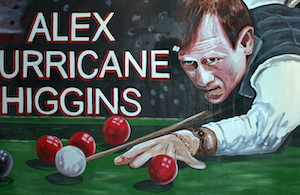 The legendary Alex ‘Hurricane’ Higgins, the so-called People’s Champion who did as much as anyone to popularise the game, was notorious for heavy smoking, drinking and drug-use and died aged just 61. You wonder how the player described by Steve Davis as snooker’s ‘one true genius’ might have fared with just a slightly healthier life-style. Surely he’d have picked up more than two world titles?
The legendary Alex ‘Hurricane’ Higgins, the so-called People’s Champion who did as much as anyone to popularise the game, was notorious for heavy smoking, drinking and drug-use and died aged just 61. You wonder how the player described by Steve Davis as snooker’s ‘one true genius’ might have fared with just a slightly healthier life-style. Surely he’d have picked up more than two world titles?
|
COMMENTATORS CURSE: |
Clear the colours
You’ll know the old joke: A man walks into the doctor’s complaining of stomach ache.
‘What do you eat?’ asks the doc.
‘Snooker balls,’ he replies.
‘Snooker balls?’
‘Yes. The black and white for breakfast, the reds for lunch and pink and blue for dinner.’
The doctor nods. ‘Well, I can see your problem. Not enough greens.’

In fact, all the colours in snooker can help you remember the variety of fruit and veg available when choosing your five a day and why they’re good for you. (Particularly useful if you’re thinking of following the example of Australian Neil Robertson and fellow former world champion Peter Ebdon and eating vegan.)
- Red - tomatoes, strawberries, raspberries etc are coloured by lycopene, an anti-oxidant. (Antioxidants help boost the heart and beat cancer.)
- Yellow - yellow and orange fruit get their colour from carotenoids (betacarotene in carrots, for example, converts to vitamin A). There’s potassium, vitamin C and some lycopene too. Good for the prostate and cholesterol.
- Green - limes, kiwis, spinach and asparagus get their colour from chlorophyll but also have carotenes and vitamins to reduce cancer risk. Remember green tea too - infused with antioxidants.
- Brown - the brown/white family of fruit and veg includes garlic (lots of the antioxidant allicin) and mushrooms (fibre, B vitamins), bananas (potassium) and onions (antioxidants again). Potatoes including chips (!) don’t count.
- Blue - from blueberries to beetroot, these get their colour from anthocyanin which again has antioxidant properties.
- Pink - er, well, some of the yellow and red families qualify here. Pink grapefruit - like all grapefruit - has many health benefits (though watch out as it can interfere with certain meds) but let’s go with a fish instead: salmon (high in omega 3s).
- Black - blackcurrants (up there with the more trendy goji and acai berries in nutrients and antioxidants), blackberries and everybody’s favourite emoji, the aubergine - similar benefits to the blue family.
In snooker you pot red, black, red, black, red, black - in theory, anyway - but when it comes to your diet, pot the full variety of colours.
What about red meat?
Go easy. There’s a link between red and processed meat and the UK’s second biggest cancer killer, bowel cancer. (The biggest cancer killer is lung cancer but you know all about the risk of smoking.)
A good break
Sitting watching your opponent compile a big break isn’t just bad for the scoreboard. Studies have linked excessive sitting with being overweight and obese, type 2 diabetes, some cancers, and early death generally.
So if you’re watching the snooker, get a big break yourself and move. Perhaps exercise in front of the TV. Static bike, yoga, weights, stretching, there are all sorts of exercises you can do while half-watching the box.
Go for a walk between frames and sessions. We all enjoy the analysis of former world champion John Parrott but he does keep repeating himself. (Personally I’m hoping that one year ITV will get the rights to the world championship just so Hazel Irvine can say: ‘so who will play second in the next frame? Find out after the break.’)
|
COMMENTATORS CURSE: |
Eyes on the ball
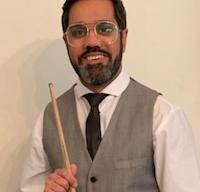 Dennis Taylor famously won the World Championship with some specially-made upturned glasses. (Our health expert Rohit has a similar pair.) You can now buy these yourself. But you may not need them. Martin Gould - world number 29 - plays in a regular pair of specs. It’s interesting too that many professionals including Mark Williams, Peter Ebdon and Mark Allen are colour-blind.
Dennis Taylor famously won the World Championship with some specially-made upturned glasses. (Our health expert Rohit has a similar pair.) You can now buy these yourself. But you may not need them. Martin Gould - world number 29 - plays in a regular pair of specs. It’s interesting too that many professionals including Mark Williams, Peter Ebdon and Mark Allen are colour-blind.
At the table, not under it
The NHS advise men not to drink more than 14 units of alcohol a week. (Easy to remember, it’s 147 - the snooker maximum).
Such guidance will have 80s Canadian star Bill Werbeniuk spinning in his grave. Amazingly, big Bill’s pint-a-frame refuelling methods were sanctioned by his doctors for a hereditary tremor while Bill claimed the booze was a ‘tax-deductible’ business expense. It all shows how far medical knowledge - if not taxation advice - has come since the 80s:
- pace yourself
- don’t drink on an empty stomach
- opt for a safety shot: have the odd soft drink or better still, glass of water
- generally a clearer liquid means less of a hangover
- drink water before bed and in the morning
- give your liver a few days off (at least 48 hours)
- don’t drive and know how you’re getting home
- don’t mix drinks (and that includes so-called energy drinks).
Having said all that, snooker is good for drinkers. It improves hand-eye coordination - very important whether pouring or supping.
Use the rest
Sitting in front of a screen all day can make it difficult to get to sleep later on. Late nights - as experienced by 18.5 million Brits in 1985 when Dennis Taylor beat Steve Davis on the final black in the wee small hours to win his only world title - and loss of sleep (even a few hours for a few days) affects mood and judgement.
A short nap can improve your mood enormously (perhaps someone could politely mention it to John Virgo) and give you a boost without affecting your night’s sleep.
|
COMMENTATORS CURSE: |
Enjoy the Snooker World Championships and perhaps get inspired: anyone can enjoy a frame of snooker.
|
The Men’s Health Forum is committed to fully participating in NHS England’s Information Standard Scheme for health and social care information. This is not health information as such but a bit of snooker fun. Although it is NOT updated regularly in line with the Information Standard, references for all the statistics and health and medical claims at the time of writing are available on this site.
|
|
The Men’s Health Forum need your support It’s tough for men to ask for help but if you don’t ask when you need it, things generally only get worse. So we’re asking. In the UK, one man in five dies before the age of 65. If we had health policies and services that better reflected the needs of the whole population, it might not be like that. But it is. Policies and services and indeed men have been like this for a long time and they don’t change overnight just because we want them to. It’s true that the UK’s men don’t have it bad compared to some other groups. We’re not asking you to ‘feel sorry’ for men or put them first. We’re talking here about something more complicated, something that falls outside the traditional charity fund-raising model of ‘doing something for those less fortunate than ourselves’. That model raises money but it seldom changes much. We’re talking about changing the way we look at the world. There is nothing inevitable about premature male death. Services accessible to all, a population better informed. These would benefit everyone - rich and poor, young and old, male and female - and that’s what we’re campaigning for. We’re not asking you to look at images of pity, we’re just asking you to look around at the society you live in, at the men you know and at the families with sons, fathers and grandads missing. Here’s our fund-raising page - please chip in if you can. |
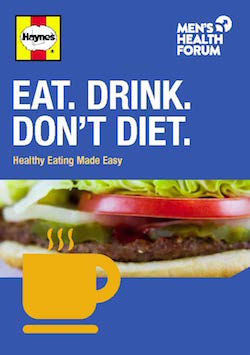


 Images here and in the printed version of Snooker Survival from our partners the WPBSA, Rohit Sagoo and the following available under Creative Commons licences:
Images here and in the printed version of Snooker Survival from our partners the WPBSA, Rohit Sagoo and the following available under Creative Commons licences: 